
More evidence that low-calorie sweeteners are bad for your health
Studies show that artificial sweeteners can raise the risk of hypertension, metabolic syndrome, type 2 diabetes and heart disease, including stroke.

Festival season can be a glorious time of friends, freedom and sunshine.
If you are a regular festival-goer you have probably got your festival pack of suncreams and cover-ups, as well as bug sprays and rain protection in case the weather changes. You maybe even packed some vitamins to keep you going through the long nights of partying and of course took steps to protect your phone and other valuables in the crowd. But one thing you may have overlooked is your ears
Seeing your favourite band at a festival can make some great memories. The sheer volume of a live gig isn’t just an aural experience. It creates a wave of vibrations that are part of the physical experience of the gig as well. But as with all events where there is loud music it can have a damaging impact on your hearing.
Your hearing depends in part on delicate hair cells in the inner ear that transmit the energy from sound, picked up by the outer ear, to the brain. They do this by converting sound to electrical impulses. Loud noises blast and irreversibly damage these cells, leading to hearing loss and sometimes tinnitus, an unpleasant condition in which you hear ringing, whooshing or high-pitched whining sounds. When tinnitus is continuous it can be extremely distressing.
Noise is the most common cause of hearing loss
The most common cause of deafness is noise-induced hearing loss. Your risk is related to how loud the noise is, how close you are to it and how long you’re exposed to it. A normal conversation is around 65 decibels (db); under 75db your ears are safe.
Continuous exposure (eight hours a day) to noise over 85db (equivalent to a heavy lorry passing nearby) can cause permanent damage to ears. But loud rock shows are between 110 decibels and 120 decibels and can be as high as 140 if you are standing in front of the speakers.
After leaving a gig or club it’s not uncommon to have pain in your ears, ringing or temporary deafness. Usually this will stop after a while but if you go to enough loud concerts, combined with listening to an MP3 player full blast (110db- equivalent to a chainsaw) the rest of the time, your will suffer ear damaged.
So if you are going to check out a lot of live shows this season, then here’s some things you can do to protect your ears from damage.
Get in position
You might be tempted to creep your way up toward the stage to get as close as possible to the action, but close to the speakers is the absolute worst place for your ears to be. Find a place further back in the crowd arrive early if you can and find the perfect central spot that gives you a great view but keeps you away from the loudest music.
Invest in earplugs
It may seem counterproductive to wear earplugs to a concert or festival. But did you know that your favourite band is probably wearing them as they perform?
Musicians have known for a long time that excessively loud noise can damage their hearing, which is many wear special musicians’ earplugs on stage.
Many people think that wearing earplugs would hinder their ability to enjoy the show, when in fact it’s quite the opposite. High-quality earplugs filter and attenuate the sound rather than block it out, reducing the overall noise levels by anywhere between 15 and 35 decibels. They’re widely available online and at many live music venues and shouldn’t spoil your enjoyment of the music.
Turn down the music
When you head back to the tent you may be tempted to listen to your personal music player at very high volumes to recreate the thrill of a live performance or to drown out background noise. Don’t.
All mp3 players and phones bought within the EU have a ‘smart volume’ feature, which keeps you from turning the music up to ear damaging levels. Make sure you use it. A good rule of thumb is listen to your music at 60% of the maximum volume for no more than 60 minutes a day.
Take a break
At a minimum, take 10 minutes out from the music every hour. Don’t be fooled that outdoor concerts are somehow better for your ears; many bands crank up the volume outdoors to make up for atmospheric loss.
If your festival offers other delights like a massage tent take advantage of it.
Most importantly, after the fun is over give your ears time to recover. According to Action on Hearing Loss, you need at least 16 hours of rest for your ears to recover after spending around two hours in 100dB sound. Not taking time out to quietly recover increases the risk of permanent deafness.

Please subscribe me to your newsletter mailing list. I have read the
privacy statement